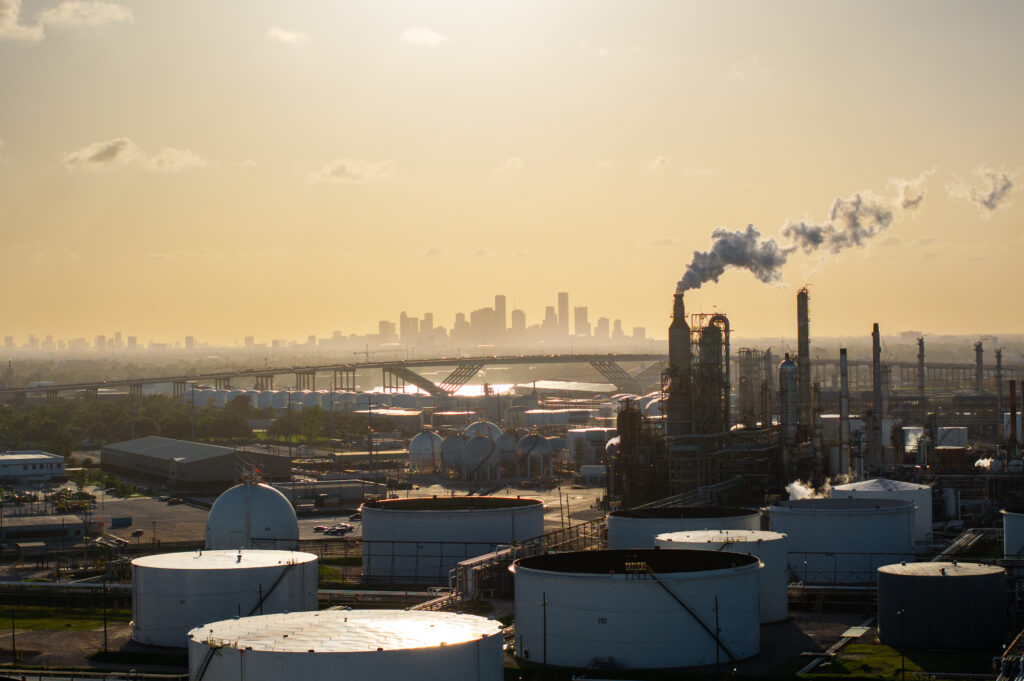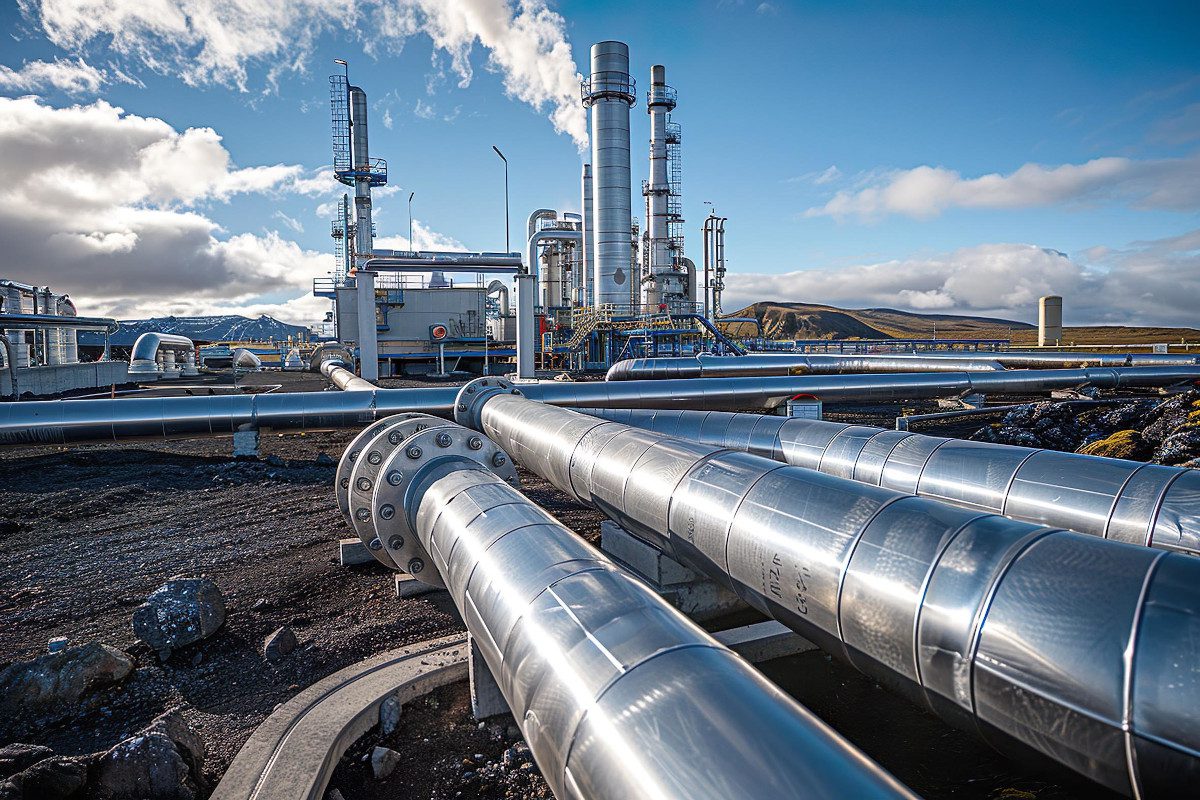DUBAI, United Arab Emirates—Domestic U.S. climate politics played out on an international stage this weekend at COP28, as a bipartisan congressional delegation mingled with world leaders and touted President Biden’s climate record.
At a press briefing Saturday outside the U.S. Climate Center at the conference, a group of Democratic members from the House Energy and Commerce Committee said Biden’s domestic climate policies have helped reinvigorate progress toward the global goal of reducing greenhouse gas emissions to slow global warming.
Republican members of Congress did not participate in the informal Saturday briefing, but three GOP representatives discussed the U.S. role in the global climate talks during a panel discussion on Sunday at the U.S. center.
In a different session on Sunday, also at the U.S. center, Sen. Lisa Murkowski (R-Alaska) appeared together with Democratic Sens. Ed Markey of Massachusetts, Ben Cardin of Maryland, Chris Coons and Tom Carper of Delaware, Sheldon Whitehouse of Rhode Island and Brian Schatz of Hawaii.
The Democratic congressmen who met the press on Saturday said that Biden’s investments in green energy via the 2022 Inflation Reduction Act and the 2021 Infrastructure Investment and Jobs Act have put the U.S. on target to cut emissions by about 50 percent (from 2005 levels) through 2030.
Because of Biden’s domestic policies, other countries are once again looking to the United States for climate leadership, said Rep. Frank Pallone Jr. of New Jersey, the ranking Democrat on the Energy and Commerce Committee.
“Not only are we back, we’re taking action domestically. And now, it’s quite clear that we’re seen as the major leader,” he said, explaining that members of Bahrain’s delegation had just made it clear that John Kerry, Biden’s special climate envoy, “is out front on things like methane emissions and carbon capture.”
The Democratic lawmakers also took a few shots across the aisle to point out that their Republican colleagues have not supported Biden’s climate policies at all at the federal level, even as they tout the benefits of spending on green infrastructure and renewable energy projects to their constituents back home.
“Their mantra is drill, baby drill, which they still say,” said Rep. Diana DeGette of Colorado, the committee’s second ranking Democrat. Facing international questions about the huge partisan divide on climate politics in the U.S., she added, “We’re all here as Democrats to say that the U.S. has not lost its commitments to the climate goals. We were able to achieve a lot with the Inflation Reduction Act, the [infrastructure act], all the legislation that has the biggest commitment to investing in climate, and it’s beginning to bear fruit.”
Degette also emphasized U.S. leadership in wrangling 50 oil and gas producers to join a nonbinding agreement that would cut their methane emissions to near zero by 2030. The Oil and Gas Decarbonization Charter covers 40 percent of global oil production and includes Saudi Aramco, BP and ExxonMobil.
Methane is a greenhouse gas that traps heat in the atmosphere 81 times more effectively than carbon dioxide over a 20-year period, and by some estimates has caused between one-third to one-half of all global warming during the industrial age.
Rep. Ann Kuster of New Hampshire, said that various global climate initiatives and increasing levels of climate ambition announced at COP28 would not have happened without the U.S. being here.
“Our historic climate law has spurred on other countries to raise their level of ambition and to talk about how we cooperate together,” she said.
The European Union adopted ambitious methane reduction targets in 2020. It has more ambitious emissions reduction targets than the U.S. and has made more progress toward meeting them.
Rep. Kathy Castor of Florida said it was interesting to hear Republicans talk about the major investments in their own districts, referring to local and regional economic benefits of Biden’s climate policies.
“I haven’t heard them say anything like that in our Energy and Commerce Committee meetings, so it’s gratifying to hear them talk in these bilateral discussions with other countries,” she said. “I’m encouraging them to talk more at home about the progress that we’re making, because it’s urgent that we act. We’re not acting fast enough. Back home in Florida, this past summer was brutal.”
Along with much of the rest of the country, Florida baked under intense heat waves for months and recorded its hottest summer on record, and an ocean heatwave in the waters around the state killed off most of the few coral reefs that had survived previous so-called bleaching events, which occur when ocean water temperatures become too warm, causing the coral to expel the algae living in their tissues, turning them ghostly white.
The congressional visit to COP is important at a time when other countries are uncertain about whether the U.S. will be able to sustain effective climate policies, given the country’s deep political rifts, said Rep. Nanette Diaz Barragán of California.
“One of the things we heard today from John Kerry was that he’s getting asked, all the time, Is the U.S. still committed, can we trust the U.S.,” she said. “And this is why I think it’s so important that we’re here, and we’re saying we are here to continue the fight, to stand with our global allies to fight, fight climate change.”
The GOP View of COP28
Sen. Murkowski, said that some people find it ironic that someone from an oil and gas-producing state like Alaska is involved in the climate debate.
“But I find no irony at all in it,” she said. “We must be involved because we are impacted. We see it, we face it and so we must be involved in the solutions.” COP28, she said, “is where we can put a spotlight on the problem with real assignments as to how we can move forward in a more coordinated manner.”
At the Sunday panel, moderated by Heather Reams of the Conservative Climate Foundation, GOP Rep. Kelly Armstrong, North Dakota’s at-large representative, said he came to COP28 because his state recognizes that, in order to keep producing fossil fuels, “we have to figure out how we do it in the cleanest, most efficient way possible. We produce a real valuable product that the world needs and we’re going to continue to do it. But consumers are demanding lower carbon emissions … and we’re going to give the customers what they want.”
And while most observers say COP28 has been marked by a shift toward a substantive conversation about a fossil fuel phase out, Rep. Mariannette Miller-Meeks of Iowa, had a different perception of the talks.
“What I’ve seen versus the last two COPs that I’ve been to, is I think there’s more pragmatism,” she said. “The aura is different. I think some reality set in with the war in Ukraine and what that did to energy supplies in Europe.”
Most European energy and climate policy experts, including the International Energy Agency, have said that Russia’s invasion of Ukraine has accelerated Europe’s shift away from fossil fuels toward renewable energy.
Rep. Buddy Carter of Georgia said the United States hasn’t gotten enough recognition for reducing its carbon emissions “more than the next 12 countries combined in the past 10 years while growing our economy.”
Carter also repeated the fossil industry and petrostate talking point that the global climate talks should focus on reducing emissions, rather than the source of those emissions, even though research shows that various existing abatement technologies can only capture tiny amounts of carbon dioxide.
Who Supports a Fossil Fuel Phase Out?
One thing the Democratic lawmakers didn’t talk about on Friday until asked was the fossil fuel phaseout that 106 countries called for at the opening of COP28, with wrangling about the precise language at the heart of the negotiations here ever since. None of the Republicans on the other panels directly mentioned a fossil fuel phase out.
Responding to a question from Inside Climate News about the fossil fuel phaseout discussions at the climate summit, Pallone repeated some of the controversial language used recently by COP28 president Sultan al-Jaber.
“What we’re hearing from both the U.S. delegation and other countries is that their focus is on emissions,” he said. “They want to look at this as how we can reduce emissions. That’s the most important thing, rather than, say, phasing out fossil fuels. It’s about reducing emissions and greenhouse gases, not necessarily what fuels you use. I got the impression that focus is more efficient.”
Major fossil fuel-producing countries, including Saudi Arabia and the United Arab Emirates, have used language on reducing emissions to try and deflect attention from a fossil fuel phaseout and focus instead on carbon capture and storage. But climate experts have said clearly those technologies can only capture a tiny percentage of global greenhouse gas emissions, with little evidence to suggest they could be scaled up in time to help reach global climate goals.
This story is funded by readers like you.
Our nonprofit newsroom provides award-winning climate coverage free of charge and advertising. We rely on donations from readers like you to keep going. Please donate now to support our work.
Donate Now
The embrace of a fossil fuel phaseout by 27 member states of the European Union and 79 members of the Organisation of African, Caribbean and Pacific States came because science shows that moving away from fossil fuels is the only realistic way to reach the Paris Agreement’s goal of limiting warming to 1.5 degrees Celsius above pre-industrial levels.
“My understanding is that the U.S. is committed to a phaseout and that that’s been their language,” said Rep. Diaz Barragán, adding that she absolutely supports that direction.
“And when I asked Australia, which is heavily reliant on coal, that’s also what they are moving toward, a phaseout. But when we talked to countries like Bahrain, they wanted to focus on emissions,” she said.
The Democratic lawmakers also acknowledged that it might be difficult for the U.S. to live up to the modest new commitments it made for international climate finance with Republicans controlling the House.
“As much as we need to provide some more money, I do think that these other things collectively are so much more important,” Pallone said, referring to the methane reduction agreement and other initiatives announced at COP28.
“We will try to get the funding,” he said. “But I don’t want Americans to think that this is just a money grab.”

















